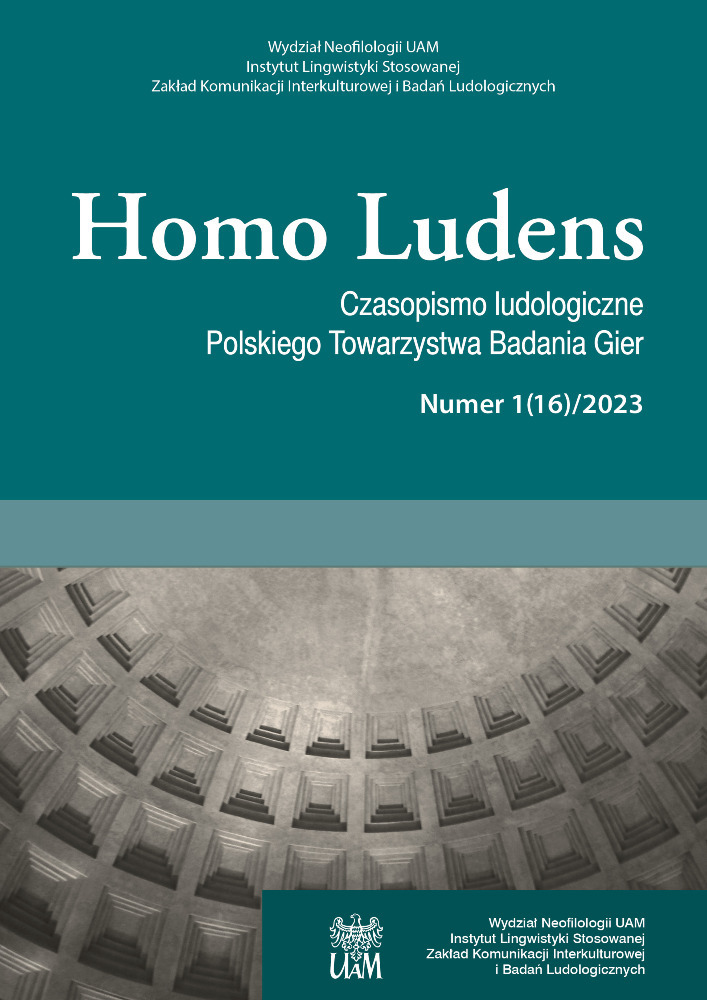Abstrakt
We współczesnej glottodydaktyce na wszystkich jej poziomach kładzie się nacisk na takie metody nauczania, które w różny sposób aktywizowałyby uczącego się. Jedną ze specjalizacji wykładanych na Uniwersytecie Śląskim jest „Projektowanie rozrywki interaktywnej oraz lokalizacja gier i oprogramowania springwrite”. W trakcie zajęć ze studentami pierwszego roku na studiach licencjackich wykorzystano jako aktywizującą metodę dydaktyczną w nauczaniu łaciny grę The Inquisitor dostępną zarówno w wersji angielskiej, jak i łacińskiej. Przedstawienie sposobu wykorzystania tej pomocy dydaktycznej, stanowiącej w drugim semestrze podstawę autorskiej metody nauki materiału zawartego w sylabusie i koniecznego do zrealizowania w odniesieniu do gramatyki i translacji, wzbogaconego dodatkowo o aktywne użycie łaciny w trakcie konwersacji na zajęciach, wykazało potrzebę modyfikacji stosowanych dotychczas metod dydaktycznych, aby odpowiadały one potrzebom współczesnego odbiorcy.
Bibliografia
Bernacka, R.E. (2004). Życzeniowy nauczyciel. W: K. Jankowski, B. Sitarska, C. Tkaczuk (red.), Student jako ważne ogniwo jakości kształcenia (s. 384–392). Siedlce: Wydawnictwo Akademii Podlaskiej.
Ciekot, K. (2004). Wybrane aspekty interakcji nauczyciele akademiccy – studiujący, a jakość kształcenia. W: Jankowski K., Sitarska B., Tkaczuk C. (red.), Student jako ważne ogniwo jakości kształcenia (s. 52–60). Siedlce: Wydawnictwo Akademii Podlaskiej.
Hostyński, P. (2009). Koncepcja relacji wspomagającej C. R. Rogersa jako inspiracja do glottodydaktyki na kierunkach neofilologicznych. O roli nauczyciela akademickiego i technikach ludycznych. Homo Ludens, 1(1), 85–105.
Karpowicz, S. (1905). Zabawy i gry jako czynnik wychowawczy. Wrocław: Księgarnia Naukowa.
Komorowska, H. (1999). Metodyka nauczania języków obcych. Warszawa: Wydawnictwa Szkolne i Pedagogiczne.
Kowalczuk, K. (2020), Edukacyjne cechy gamingu. Homo Ludens, 1(13), 89–102. DOI: https://doi.org/10.14746/HL.2020.13.5
Matczak, A. (1964), Analiza zabawy tematycznej jako działalności czyli aktywności celowej. Psychologia wychowawcza, 3(7), 293–313.
Okoń, W. (1984). Słownik pedagogiczny. Warszawa: PWN.
Online Latin Dictionary (2006). Online: https://online-latin-dictionary. com. Data dostępu: 10 grudnia 2023.
Poznańska Letnia Szkoła Żywej Łaciny i Greki (2000). Online: https://amu.edu.pl/wiadomosci/aktualnosci/studenci/poznanska-letnia-szkola-zywej-laciny-i-greki. Data dostępu: 27 grudnia 2022.
Uniwersytet Śląski (2020). Online: https://usosweb.us.edu.pl/kontroler.php?_action=katalog2/przedmioty/pokazZajecia&zaj_cyk_id=329884&gr_nr=4. Data dostępu: 27 grudnia 2022.
GRY-OnLine.pl (7 czerwca 2013). Nicolas Eymerich The Inquisitor: Book 1 – The Plague PC. Online: https://www.gry-online.pl/gry/nicolas-eyme-rich-the-inquisitor-book-1-the-plague/z33781. Data dostępu: 27 grudnia 2022.
TiconBlu (2013). Nicolas Eymerich – The Inquisitor – Book 1: The Plague [PC]. Microïds, Francja.
Wolanin, H. (2012). Gramatyka opisowa klasycznej łaciny w ujęciu strukturalnym. Kraków: Księgarnia Akademicka. DOI: https://doi.org/10.12797/9788376386034
Żylińska, M. (2013). Neurodydaktyka. Nauczanie i uczenie przyjazne mózgowi. Toruń: Wydawnictwo Naukowe Uniwersytetu Mikołaja Kopernika.
Licencja
Prawa autorskie (c) 2023 Aleksandra Golik-Prus

Utwór dostępny jest na licencji Creative Commons Uznanie autorstwa – Użycie niekomercyjne – Bez utworów zależnych 4.0 Międzynarodowe.
Szczegółowe informacje dotyczące prawa autorskiego zawarte są w umowie podpisywanej między wydawcą a autorem.
